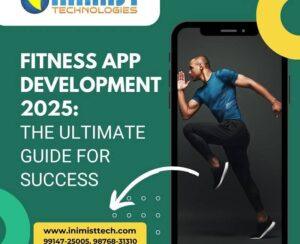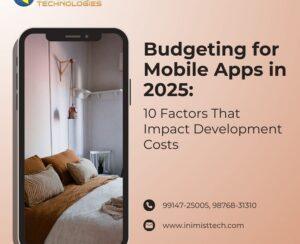
Inimist Tech | May 5, 2025
Mobile Apps for Event Companies: Necessity or Nice to Have?
In today’s fast-paced digital era, industries across the globe are rethinking how they connect with clients and audiences. The event management industry has undergone a massive transformation. From weddings and corporate seminars to music festivals and product launches, events are no longer just about physical gatherings—they are immersive experiences that demand seamless planning, communication, and engagement.

One key player in this shift? Mobile event apps.
But the question remains: are mobile apps for event companies a necessity in 2025, or are they simply a nice-to-have luxury? Let’s dive deeper into the pros, challenges, and future trends to find the answer.
The Rise of Mobile Event Apps
The way people consume information and interact with brands has changed dramatically. More than 85% of people use smartphones to access event-related information, from schedules and tickets to networking opportunities. This has encouraged event organizers to explore event technology solutions like apps for smoother customer experiences.
In the past, an event management app was considered an innovative extra. Today, however, it’s quickly becoming the standard. Mobile apps provide real-time updates, streamline communication, and allow for better engagement before, during, and after an event.
Why Mobile Apps Are Becoming a Necessity
- Seamless Communication with Attendees
Events involve multiple moving parts—schedules, speakers, venues, and last-minute changes. Event management apps give organizers the ability to send instant push notifications and updates to attendees. Real-time communication reduces confusion and ensures a smoother flow.
- Enhanced Attendee Engagement
An event’s success is about logistics and engagement. Mobile apps for conferences and corporate events often include live polls, Q&A sessions, gamification, and networking features that keep participants involved and excited.
- Data Collection and Analytics
With an event planning app, organizers can track attendee behavior, session popularity, and feedback. This data helps improve future events, personalize experiences, and show ROI to sponsors—something that’s difficult with traditional methods.
- Sustainability and Cost Savings
Moving everything—tickets, brochures, schedules—onto a mobile app for event planning saves on printing costs and highlights eco-friendly practices. With sustainability a growing priority, digital solutions create a positive brand image.
- Networking Opportunities
Networking is a major reason people attend conferences. Event apps with built-in directories and chat tools allow for smarter matchmaking. This feature is particularly valuable for corporate event apps, where professional connections drive event success.
Why Some Still See Apps as “Nice-to-Have”
Despite the clear benefits, there are reasons why smaller companies may still see event apps as optional:
- High Development Costs—Custom apps can cost thousands of dollars, making them harder to justify for small-scale events.
- Event Scale—A small workshop or community event may not need a full-featured mobile app; email and WhatsApp might be enough.
- Adoption Challenges—Getting attendees to download an app isn’t always easy, especially if it doesn’t add obvious value.
- Tech Dependence—Relying solely on apps can backfire if servers crash or Wi-Fi fails. Offline alternatives are still necessary.
Hybrid Approach: Balancing Needs and Budgets
Many event organizers are now opting for a hybrid event technology strategy. For large or high-budget events, they invest in event management software and apps. For smaller events, they use simple tools like landing pages, email, or ready-made platforms.
Another rising trend is white-label event apps—customizable apps provided by third-party vendors. These allow event companies to enjoy app benefits without investing in costly development.
The Future of Event Technology
Looking ahead, event apps are set to become even more critical. Here’s why:
- AI-Powered Personalization—Apps will recommend sessions, networking matches, and even seating arrangements using artificial intelligence.
- AR/VR Features—Hybrid events will use augmented reality (AR) and virtual reality (VR) within apps to engage online participants.
- In-App Payments—Mobile apps for events will act as cashless payment platforms for ticket upgrades, food stalls, or merchandise.
- Advanced Analytics—Sponsors will increasingly demand measurable engagement data, something only event management apps can provide.
Real-World Examples of Mobile Event Apps
- Music Festivals: Apps like Coachella’s provide live schedules, venue maps, and artist updates for seamless experiences.
- Corporate Events: Platforms such as Cvent and Whova offer registration, live Q&A, and attendee engagement features.
- Private Events: Wedding apps are gaining popularity for RSVPs, photo sharing, and digital invitations.
These examples highlight how mobile apps for events improve experiences across industries.
Final Verdict: Necessity or Luxury?
So, are mobile apps for event companies truly a necessity?
For large-scale conferences, exhibitions, and festivals—yes, they are a necessity. They improve communication, engagement, networking, and data collection in ways traditional tools can’t match.
For smaller or more intimate gatherings, they can still be considered a nice-to-have. Traditional channels may be more cost-effective in those cases.
But as technology and attendee expectations evolve, the line is blurring. In the near future, not having a mobile event app might make a company seem outdated.
Conclusion
The events industry thrives on innovation, personalization, and smooth execution. While mobile apps were once optional add-ons, they are fast becoming core tools in event technology solutions. Whether you’re planning a 50-person seminar or a 5,000-attendee global summit, investing in a mobile event app can transform your event experience.
The real question is no longer whether mobile apps are a necessity—but how quickly event companies can adapt before being left behind.
Latest Posts
-
Hello World!
February 5, 2026 -
What Makes Modern Online Casinos So Popular
January 30, 2026 -

-

Fitness App Development in 2025: The Ultimate Guide for Success
November 5, 2025 -

